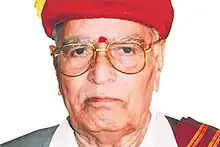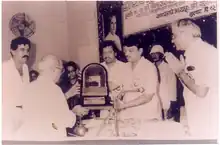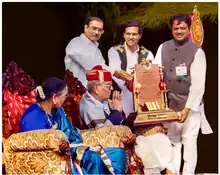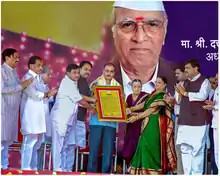Nana Dharmadhikari
Narayan Vishnu Dharmadhikari (1 March 1922 – 8 July 2008), popularly known as Nanasaheb Dharmadhikari was an Indian spiritual master, social reformer and propagator of Hindu spiritual literature. He initiated his social movement at Revdanda, Raigad district, India.
Nanasaheb Dharmadhikari | |
|---|---|
| नानासाहेब धर्माधिकारी | |
 | |
| Born | Narayan Vishnu Dharmadhikari 1 March 1922 Revdanda, Maharashtra, India |
| Died | 8 July 2008 (aged 86) Pune, Maharashtra, India |
| Spouse | Sharada Devi Dharmadhikari |
| Children | Dattatreya Dharmadhikari, Shrikrishna Dharmadhikari |
| Awards | National Integration Award (By Seroc India) (1999)
[1] Doctor of Literature (2004) [2] Maharashtra Bhushan Award (2008) [3] |
| Website | dsndp |
The primary mission of his movement was to encourage rationality and eradicate superstition through the elimination of orthodox customs and traditions prevalent among some sections of Indian society.
He is said to have begun his movement with only 5 followers. During the first days of his movement, Dharmadhikari encouraged his followers to undertake pilgrimage to the most prominent Hindu holy towns in India. There, he instructed his followers to observe the existing social conditions. He believed that these places were littered with sins.
After pilgrimage, Dharmadhikari founded an organization named Shree Samarth Prasadik Aadhyatmik Seva Samiti. He was an active proponent of the philosophy of the 17th-century Indian saint Samarth Ramdas, who wrote philosophical texts such as Dasbodh, Manache Shlok, and Atmaram. Dharmadhikari has millions of followers around the world. He was awarded by numerous government and social organizations in recognition of his work.[4][5] In 2008, the Government of Maharashtra conferred upon him the Maharashtra Bhushan Award, the highest civilian award in the state.
Nanasaheb Dharmadhikari was born to a family bearing Shandilya as the last name. Around 350 years ago, his ancestors were awarded the title of Dharmadhikari (authority on Dharma) by the 17th-century Maratha naval chief Kanhoji Angre. Dharmadhikari derived inspiration from the philosophical text, Shrimat Dasbodh (or simply Dasbodh). After several years of spiritual research and inquiry, he started a unique social reformation movement on 8 October 1943, also the occasion of Vijayadashami or Dussehra. As part of the movement, he delivered spiritual discourses known as Nirupan on a weekly basis. These lectures were mostly based on Dasbodh and other philosophical texts. Only seven people attended his discourses during the first few months and over time, the attendance numbers grew exponentially. His support base eventually expanded to more than 10 million. Currently, lecture programs known as Shri Baithak (श्रीबैठक))[6][7] take place in multiple countries around the world including the UAE, Britain, Singapore, Australia, Nigeria and Iran among others. During the initial phase of his movement, Dharmadhikari would walk long distances of up to 70 km to deliver his lectures. Along with lectures, he also conducted counseling sessions to people.



References
http://www.shreedarshan.com/saint-sadguru-nanasaheb_dharmadhikari.htm#top
- "Siroc India National Integration - Dr. Shri Narayan Vishnu alias Nanasaheb Dharmadhikari".
- "D. Lit. - Dr. Shri Narayan Vishnu alias Nanasaheb Dharmadhikari".
- "Raigad Bhushan Puraskar 2003-04 - Dr. Shri Dattatreya Narayan alias Appasaheb Dharmadhikari".
- "Dr. Shri Nanasaheb Dharmadhikari Pratishthan". dsndp.com. Retrieved 5 September 2022.
- "श्रीबैठकीतून समाजप्रबोधन करणारे नानासाहेब धर्माधिकारी". tv9marathi.com. मृणाल पाटील. Retrieved 5 September 2022.
- "Dr. Shri Nanasaheb Dharmadhikari Pratishthan". dsndp.com. Retrieved 5 September 2022.
- "श्रीबैठकीतून समाजप्रबोधन करणारे नानासाहेब धर्माधिकारी". tv9marathi.com. मृणाल पाटील. Retrieved 5 September 2022.
- "Raigad Mitra - Dr. Shri Narayan Vishnu alias Nanasaheb Dharmadhikari".
- National Integration Award” by Seroc (India) on 16th May 1999 https://www.dsndp.com/pratishthan.html
- "Samaj Bhushan Puraskar by Hirwal Pratishthan- Dr. Shri Narayan Vishnu alias Nanasaheb Dharmadhikari".
- "Raigad Bhushan Puraskar 2003-04 - Dattatreya Narayan alias Appasaheb Dharmadhikari".
- "'Maharashtra Bhushan' Award Presented to Spiritual Leader". Outlook India. Archived from the original on 18 July 2011. Retrieved 2 December 2009.